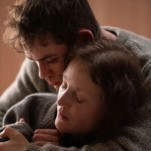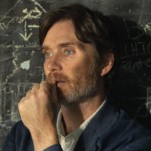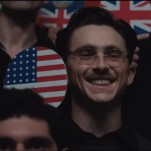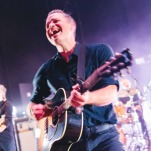Fear and Loathing in Senegal: Erratic, Dreamy Un Ange Goes through Hell
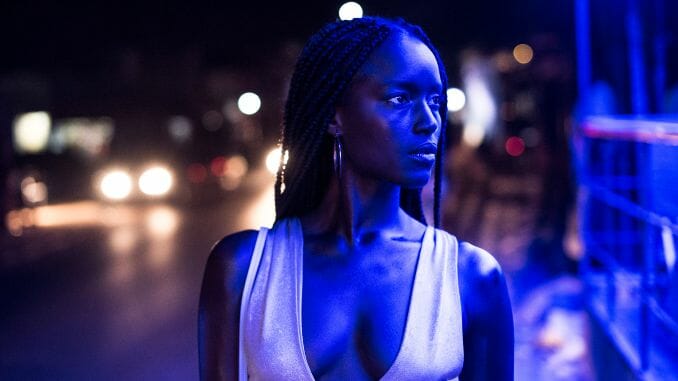
Two people are paid for their services to others: Thierry (Vincent Rottiers), a Belgian pro cyclist who once had a shot at immortality, and Fae (Fatou N’Diaye), the Senegalese sex worker he abandons his training to spend a night with. Thierry’s overbearing self-loathing, grown from his reliance on the press cycle rather than his bicycle to make money as he’s caught in a drug-and-doping scandal, is only matched by Fae’s stiff-spined dignity. She’s not ashamed of her lot, but she’s certainly not satisfied with it. In Un Ange, these burnout and heart-of-gold stereotypes share a passionate, hallucinatory evening that only gets better the further it gets from the rote realities of writer/director Koen Mortier’s narrative.
Thierry’s tourism and Fae’s daily routine are crosscut reflections, two sides of the same transaction that slowly becomes something more—as hard to believe as that may be. Rottiers’ high-strung colonizer confidence, shoulders thrust back as he and his brother saunter through the world looking for the next fix of whatever will help their self-esteem, contrasts with N’Diaye’s quiet self-assuredness. Thierry navigates the world with a vacationer’s entitlement while Fae simply runs through a routine, her voiceover made superfluous by the almost bored way N’Diaye ambles through the streets, halls and showers. This embodies the film’s ongoing conflict between capable visual storytelling and a faltering confidence that consistently undercuts it with an overwritten script. That the pair will eventually collide is obvious, and the increasing frequency of dreamstates that punctuate their connection is as obvious as Thierry’s substance problem.
But how these druggy, depressive imaginings influence our feelings throughout their dinner-and-dancing night on the town helps Un Ange stand out from the dregs of star-crossed lovers with cinematically sad lives. When Thierry professes his love for Fae, seemingly so moved by her beauty to propose to her and promise her a faraway fantasy life back in Belgium, Fae plays along. It’s more than a little hard to buy, especially considering how ferrety the short cyclist is compared to his paramour’s nearly bioluminescent beauty. You even start to think maybe they’re the imaginings of a doped-up mind—until you come to terms with the fact that every repetitive “it was all a dream” sequence contains a self-inflicted violent end to Thierry’s violent delights. Unfortunately, even Fae’s fits of imagination still center on this suicidal sad sack. Then you move on from shaking your head at the writing, which Mortier based on Dimitri Verhulst’s novel Monologue of Someone Who Got Used to Talking to Herself, and start wondering if the characters themselves are simply caught up in how cinematographer Nicolas Karakatsanis is shooting the night.
-

-

-

-

-

-

-

-

-

-

-

-

-

-

-

-

-

-

-

-

-

-

-

-

-

-

-

-

-

-

-

-

-

-

-

-

-

-

-

-





































